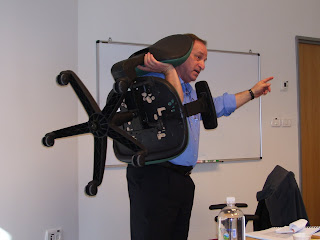The following is last week's d'var Torah by Rabbi Pinchas Allouche, Spiritual Leader of Beth Tefillah, Scottsdale, Arizona. For as long as I have known Rabbi Allouche and his family (pictured below) they exude a passion and belief in life that has no limits. Rabbi Allouche profoundly believes that there is no end to the goodness and light that each of us can project in everything that we do. His simple explanation for the oft comparison between Purim and Halloween is one of which we should all be reminded at this time of year.
Also, for those living in the Scottsdale area, or those who might find themselves vacationing there and needing a place to call "home" during your visit, you should definitely make Beth Tefillah a Shabbat stop and allow your neshamah to enjoy its vacation too.
Dear Friends,
He was nicknamed "the outsider," "the different." The norm was his personal enemy. He resented the mainstream leaders of society, as he hoped to create a change of direction for people and a new destiny for the world.
His name? Abraham the Hebrew, literally meaning: Abraham, from the other side. He was so called, for as the Talmud teaches, "the entire world was on one side, and he, Abraham was on the other side." Indeed, a true revolutionary who changed the landscape of our globe and its history, through the noble notion of monotheism.
It is Abraham's approach in this week's Torah portion that has inspired us, the Hebrew nation, to challenge our environment, its habits and its cultures, and to always thirst for true purpose and meaning. And it is this approach that has led me to question the "Halloween" festivities that have already begun to flood the streets of this country. After all, as a dear friend mentioned to me, it is just like the Jewish festival of Purim!
But is it really like Purim? True, in both festivals, we dress-up, candy is distributed, and laughter is spread. But at a deeper glance, they appear as complete opposites.
First, Purim falls in March, not in October. Second, Purim is celebrated with costumes of saints and sages, not of mischievous spirits and demons. Third, on Purim we offer and give flavorsome foods to one another. We don't demand and take it. Fourth, on Purim, joy and vivacity is spread. Not fear and death horrors. And last but not least, the heroes of Purim, Mordechai & Esther, are human beings like us. Not like phanthoms. They are a reflection of our infinite potential and our inner self, not of extraterrestrial ghosts disconnected from the profound dignity of the human being.
Of course, Halloween is not a bad holiday. If it is your custom to celebrate it, so be it, and enjoy it. In addition, we must also be cordial, polite and respectful toward our neighbors and our friends who celebrate Halloween. But this year, be the giver (of candies), not the receiver. Be the one with the divine smile, not the one with the demonic grimace.
And remember that a dark light glimmering within a menacing pumpkin does not stand a chance, in the test of space and time, in the shadow of G-d's pure and revealed light beaming through you!
He was nicknamed "the outsider," "the different." The norm was his personal enemy. He resented the mainstream leaders of society, as he hoped to create a change of direction for people and a new destiny for the world.
His name? Abraham the Hebrew, literally meaning: Abraham, from the other side. He was so called, for as the Talmud teaches, "the entire world was on one side, and he, Abraham was on the other side." Indeed, a true revolutionary who changed the landscape of our globe and its history, through the noble notion of monotheism.
It is Abraham's approach in this week's Torah portion that has inspired us, the Hebrew nation, to challenge our environment, its habits and its cultures, and to always thirst for true purpose and meaning. And it is this approach that has led me to question the "Halloween" festivities that have already begun to flood the streets of this country. After all, as a dear friend mentioned to me, it is just like the Jewish festival of Purim!
But is it really like Purim? True, in both festivals, we dress-up, candy is distributed, and laughter is spread. But at a deeper glance, they appear as complete opposites.
First, Purim falls in March, not in October. Second, Purim is celebrated with costumes of saints and sages, not of mischievous spirits and demons. Third, on Purim we offer and give flavorsome foods to one another. We don't demand and take it. Fourth, on Purim, joy and vivacity is spread. Not fear and death horrors. And last but not least, the heroes of Purim, Mordechai & Esther, are human beings like us. Not like phanthoms. They are a reflection of our infinite potential and our inner self, not of extraterrestrial ghosts disconnected from the profound dignity of the human being.
Of course, Halloween is not a bad holiday. If it is your custom to celebrate it, so be it, and enjoy it. In addition, we must also be cordial, polite and respectful toward our neighbors and our friends who celebrate Halloween. But this year, be the giver (of candies), not the receiver. Be the one with the divine smile, not the one with the demonic grimace.
And remember that a dark light glimmering within a menacing pumpkin does not stand a chance, in the test of space and time, in the shadow of G-d's pure and revealed light beaming through you!










